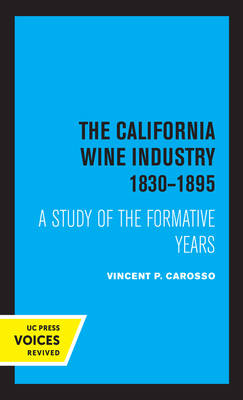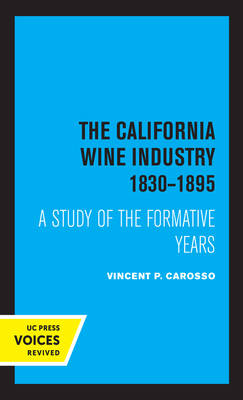
Wil je zeker zijn dat je cadeautjes op tijd onder de kerstboom liggen? Onze winkels ontvangen jou met open armen. Nu met extra openingsuren op zondag!
- Afhalen na 1 uur in een winkel met voorraad
- Gratis thuislevering in België vanaf € 30
- Ruim aanbod met 7 miljoen producten
Wil je zeker zijn dat je cadeautjes op tijd onder de kerstboom liggen? Onze winkels ontvangen jou met open armen. Nu met extra openingsuren op zondag!
- Afhalen na 1 uur in een winkel met voorraad
- Gratis thuislevering in België vanaf € 30
- Ruim aanbod met 7 miljoen producten
Zoeken
The California Wine Industry 1830-1895
A Study of the Formative Years
Vincent P Carosso
Hardcover | Engels
€ 161,45
+ 322 punten
Uitvoering
Omschrijving
The California Wine Industry, 1830-1895 offers a meticulously researched account of the formative years of California's viticulture, tracing its evolution from the mission period through to the late 19th century. The book captures the pivotal role of grape cultivation in shaping California's agricultural and economic identity. Through detailed analysis, Carosso examines the cultural, climatic, and economic conditions that made California a leading wine producer in the United States, as well as the challenges faced by early growers and winemakers in establishing the industry. The narrative highlights the profound contributions of Spanish missionaries, European immigrants, and American settlers who brought diverse techniques and traditions to the region. This volume provides valuable insights into the intersection of agriculture and society, delving into the adaptation of European viticultural practices to California's unique environment. It also explores the social, economic, and legislative shifts that influenced the industry's trajectory, including the decline of mission dominance and the rise of private enterprises. Enriched with historical anecdotes, production statistics, and discussions on climate and geography, The California Wine Industry, 1830-1895 is an essential resource for historians, wine enthusiasts, and those interested in the broader history of California's development. This title is part of UC Press's Voices Revived program, which commemorates University of California Press's mission to seek out and cultivate the brightest minds and give them voice, reach, and impact. Drawing on a backlist dating to 1893, Voices Revived makes high-quality, peer-reviewed scholarship accessible once again using print-on-demand technology. This title was originally published in 1951.
Specificaties
Betrokkenen
- Auteur(s):
- Uitgeverij:
Inhoud
- Aantal bladzijden:
- 256
- Taal:
- Engels
Eigenschappen
- Productcode (EAN):
- 9780520369733
- Verschijningsdatum:
- 25/06/2021
- Uitvoering:
- Hardcover
- Formaat:
- Genaaid
- Afmetingen:
- 140 mm x 216 mm
- Gewicht:
- 439 g

Alleen bij Standaard Boekhandel
+ 322 punten op je klantenkaart van Standaard Boekhandel
Beoordelingen
We publiceren alleen reviews die voldoen aan de voorwaarden voor reviews. Bekijk onze voorwaarden voor reviews.











